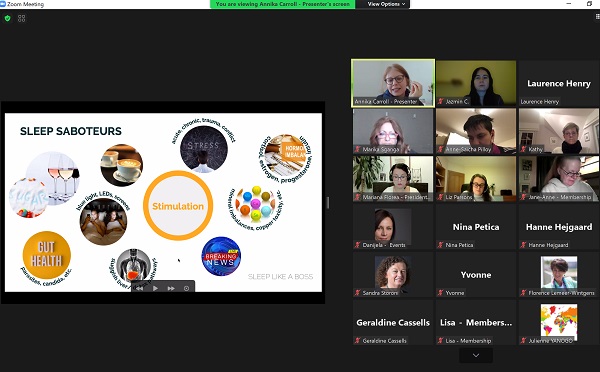 Credit: Jazmin Campbell / The NETWORK
Credit: Jazmin Campbell / The NETWORK
On Wednesday 19 January 2022, The NETWORK, Luxembourg's oldest international professional business women's association, kicked off the new year with an interactive online workshop dedicated to sleep and well-being.
Around 35 members and guests, including three past presidents of The NETWORK, joined this online event facilitated by Annika Carroll, a trained nutritionist, sleep expert and CEO of Sleep Like a Boss.
In her presentation, Ms Carroll shared how we can improve our sleep and, in turn, our energy levels. She began by explaining how sleep works in the body (the different rhythms and cycles, etc.) before looking at some of the so-called “sleep saboteurs”, such as caffeine, alcohol, sugar, stress, technological devices, hormone and / or mineral imbalances, and liver and / or gut problems.
Ms Carroll emphasised the importance of getting enough sleep (around seven to nine hours per night) and offered some tips for getting a better night’s sleep, stressing that a good bedtime routine begins in the morning: avoid checking your phone or emails within the first hour of waking up; avoid drinking coffee on an empty stomach; keep your blood sugar levels stable (avoid snacks or skipping meals); eat breakfast within an hour of waking up (protein is particularly important); get up at a similar time every day, including on weekends; go outside and get sunlight for ten to fifteen minutes within the first hour of waking up (in winter, we can opt for a seasonal affective disorder, or SAD, lamp); do a “brain dump” at the end of the day (put all of your thoughts down on paper); avoid overhead lights in the evening; avoid doing sports up to three hours before going to bed; have a wind-down routine one hour before going to bed (turn off your phone, read a book, do some light stretching, etc.).
Following this presentation, participants discussed the topic further in Zoom breakout rooms. They shared their personal sleep experiences and “sleep saboteurs” as well as what worked for them. The main conclusion was that everyone is different, although the fundamentals stay the same. Some cited hormonal changes such as menopause as a barrier to getting a good night’s sleep, others mentioned the disruption of their sleep pattern due to that of their young children. Overall, participants agreed that getting fresh air and natural light, doing light exercise (stretching or yoga) after waking up and before bed and disconnecting (switching off devices) in the evening were some of the most effective tools for sleeping well.
The evening concluded with Annika Carroll sharing her main takeaways. For her, the real gamechangers for getting a good night’s sleep were sunlight exposure in the morning and during the day, eating enough protein (about 30g) at breakfast and lunch and doing a “brain dump” at night.








